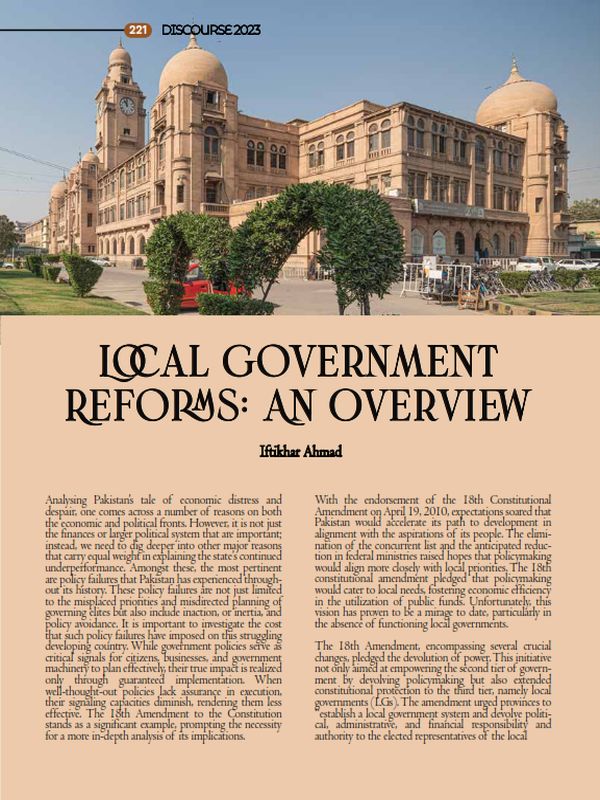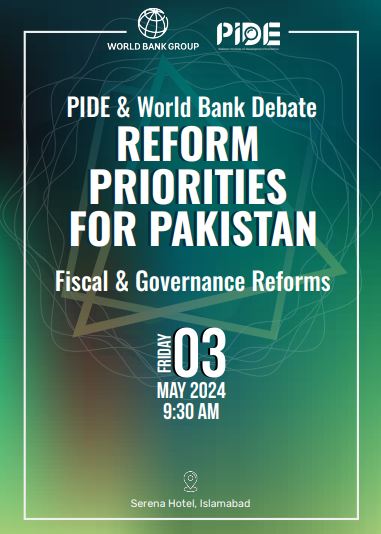Local Government Reforms: An Overview
Analysing Pakistan’s tale of economic distress and despair, one comes across a number of reasons on both the economic and political fronts. However, it is not just the finances or larger political system that are important; instead, we need to dig deeper into other major reasons that carry equal weight in explaining the state’s continued underperformance. Amongst these, the most pertinent are policy failures that Pakistan has experienced throughout its history. These policy failures are not just limited to the misplaced priorities and misdirected planning of governing elites but also include inaction, or inertia, and policy avoidance. It is important to investigate the cost that such policy failures have imposed on this struggling developing country. While government policies serve as critical signals for citizens, businesses, and government machinery to plan effectively, their true impact is realized only through guaranteed implementation. When well-thought-out policies lack assurance in execution, their signaling capacities diminish, rendering them less effective. The 18th Amendment to the Constitution stands as a significant example, prompting the necessity for a more in-depth analysis of its implications.
With the endorsement of the 18th Constitutional Amendment on April 19, 2010, expectations soared that Pakistan would accelerate its path to development in alignment with the aspirations of its people. The elimination of the concurrent list and the anticipated reduction in federal ministries raised hopes that policymaking would align more closely with local priorities. The 18th constitutional amendment pledged that policymaking would cater to local needs, fostering economic efficiency in the utilization of public funds. Unfortunately, this vision has proven to be a mirage to date, particularly in the absence of functioning local governments.
The 18th Amendment, encompassing several crucial changes, pledged the devolution of power. This initiative not only aimed at empowering the second tier of government by devolving policymaking but also extended constitutional protection to the third tier, namely local governments (LGs). The amendment urged provinces to “establish a local government system and devolve political, administrative, and financial responsibility and authority to the elected representatives of the local governments”. Thirteen years later, the critical question arises: to what extent has this policy been faithfully implemented? This discussion presents two perspectives—firstly, the incurred costs and expansion of federal ministries, along with associated inefficiencies, and secondly, the missed opportunities for capacity building and efficiency attributed to the absence or compromise of LGs. For now, our focus will be on the latter, elucidating essential points to kickstart reforms.
In an analysis of Local Governments (LGs) in Pakistan, it becomes evident that they neither enjoyed a secure term nor a clear mandate. Despite provinces asserting their claims and swift implementation of NFC awards, the Provincial Finance Commissions (PFCs) have been largely non-functional, often dictated by provincial governments. The commitment to allocate ’70 percent development spending by LGs’ was reversed in Khyber Pakhtunkhwa, and in Punjab, LGs saw their mandates eroded with the establishment of 56 companies under provincial control. Similarly, in Sindh, nominated members of the provincial government held veto powers, enabling them to reject plans presented by lower-tier representatives. Consequently, LGs have remained more of a facade and were never granted the autonomy to plan or execute local policies in line with local aspirations. This situation underscores a persistent ‘Policy Avoidance,’ wherein a significant focus has been on current expenditures, with limited or no authority granted over development spending.
The episodic nature of the Local Government (LG) system has hindered its continuity, preventing it from establishing itself as a consistent and viable pro-people governance system. With compromised mandates and a lack of sustained engagement, the paralysed local governance system faces minimal acceptance from Members of the National Assembly (MNAs), Members of Provincial Assembly (MPAs), and civil administration, who often view LGs as a competing system. In Pakistan, politicians campaigning for MNAs and MPAs frequently use slogans falling within the domain of LGs, creating a strong incentive for those in power to incapacitate LGs and maintain control. For instance, in a district with four MNA seats and eight MPA seats, allowing a single Mayor to perform effectively may be perceived as a threat to the established political order. Furthermore, these same legislators are responsible for defining the rules of the game for LGs, reinforcing their disincentive to empower LGs on various fronts and protect their own turf. This perverse incentive poses a significant barrier to LGs’ performance within the current governance system and represents the primary issue requiring correction. Enabling MNAs and MPAs to focus on their legislative responsibilities and entrusting on-the-ground service delivery to LG representatives could pave the way for increased efficiency, drawing on local knowledge, as anticipated in the existing literature. Therefore, politicians with a genuine interest in local issues and development agendas should be encouraged to contest local elections for mayoral positions and contribute in that capacity.
The second reform can be elucidated through the concept of ‘Business Improvement Districts (BIDs),’ a successful model in many metropolitan cities globally. In BIDs, local businesses contribute additional taxes that are reinvested within their locality, enhancing the business environment and consequently benefiting those businesses. This incentive is notably absent in our Local Government (LG) system across all four provinces. In Pakistan, any local tax or levy collected, or revenue generated at the local level, is mandated to go to the provincial fund before being reallocated. This raises a critical question: if LGs cannot retain their taxes, why should local representatives burden their electorate with additional taxes? The current rules lack logic, as local representatives are expected to risk their goodwill by taxing their constituents without a guarantee that the same amount will be reinvested for the community’s betterment. This scenario results in limited own-source revenues, leaving LGs heavily dependent on transfers of funds from higher tiers of government. Consequently, this dependency leads to inefficiencies, cost escalations, and delays in implementing local development agendas, even if capacity issues and cooperation among LGs and civil administration are assumed to be fixed. This identifies the second reform imperative: empowering LGs by enhancing their capacity to levy, collect, and retain local funds, enabling them to deliver more effectively.
Aligning the Sustainable Development Goals (SDGs) with the mandate of Local Governments (LGs) reveals significant consistency, forming the basis for the third reform. This reform advocates for adopting a bottom-up approach in SDG spending by directing ample SDG funds through LGs rather than central policymaking and allocation. Given that the majority of SDGs fall within the domain of LGs, allocating these funds to MNAs lacks logic and introduces inefficiencies and distortions into the process. To enhance the effectiveness of SDG implementation, LG representatives and officials may require specific training sessions to raise awareness and disseminate international best practices. Incorporating local feedback and ownership is crucial to realizing the achievement of SDGs.
Furthermore, LGs should be granted matching grants in health, education, and WASH (Water, Sanitation, and Hygiene) to focus on long-term goals. Clarity in functions across the three tiers of LGs is imperative: the district tier for planning and prioritising, the Tehsil tier for execution and supervision, and the third tier for policy input, firsthand information gathering, priority setting, devising development plans, and local facilitation on the ground. Each tier should have the authority to levy and collect taxes, prices, and fees. Direct elections for the head of each tier will ensure local representatives are accountable to the electorate. Provincial governments should refrain from exploiting their oversight role, as a compromised LG system inherently lacks the efficiency benefits predicted in the literature. Hence, political will is identified as the key reform to initiate effective LGs.
The author is an Associate Professor at the Pakistan Institute of Development Economics (PIDE), Islamabad.





